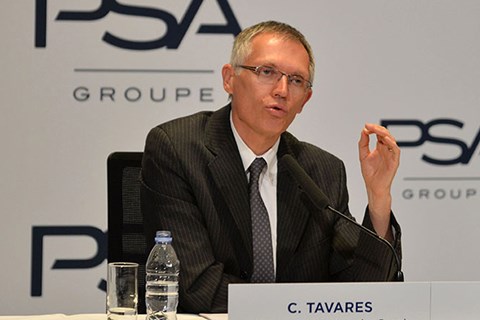► PSA Euro 5 diesels’ emissions under fire
► Public prosecutor asked to investigate
► ‘We were extremely shocked,’ says CEO
Peugeot-Citroen feels under attack from the French government and will fight for its reputation in court if necessary, says the company’s CEO, following news that the public prosecutor has been asked to investigate its diesel engines’ emissions performance.
Giving his first interview since news of the probe broke on Friday 10 February, PSA Groupe CEO Carlos Tavares told CAR: ‘We were extremely surprised and shocked [at the referral to the public prosecutor]. That’s because the products of our brands have already been checked many times, measured, under the instruction of the authorities. They were always among the best, always compliant. We don’t really understand why this happened.’
‘To be frank with you, our employees feel like they are being aggressed by their own administration. That’s why we make sure we protect our employees, we will use all legal means we can, to find the best way to protect our employees, our customers’ trust, and the stakeholders.’
Five of PSA’s Euro 5 diesels alleged to emit higher NOx levels at motorway speeds
Last week, France’s Competition, Consumer Affairs and Prevention of Fraud Department sent a file to the public prosecutor, concerning the emissions performance of Peugeot-Citroen’s Euro 5 diesel engines (covering 2009 to 2015). In government tests, five of the company’s Euro 5 diesels are alleged to emit higher NOx levels at motorway speeds.
But PSA engineering chief Gilles Le Borgne told Reuters that the cars’ exhaust gas recirculation programme was deliberately reduced at higher temperatures to improve fuel efficiency and carbon dioxide emissions out-of-town, where NOx and particulate output is less critical. PSA vows it has done nothing wrong and has never used software to defeat an emissions test, the violation that has led to Volkswagen facing a bill in excess of $25 billion for cheating US regulations.

‘Our strategy is to be ethical’
The decision to refer Peugeot-Citroen to the public prosecutor is ironic: the government has two representatives on the PSA supervisory board following a decision to bail out the then-struggling car maker in 2014, when it took a 14% stake. And Peugeot is Europe’s leading car maker on CO2 emissions, with an average fleet output of 102.4g/km last year.
Last year, Peugeot voluntarily decided to ratify the real-world emissions of its current, Euro 6 diesel and petrol engines, using on-road tests verified by independent agencies. The procedure, similar to the incoming RDE test and using an exhaust probe to assess actual tailpipe emissions during driving, has shown in excess of a 25% penalty compared with fuel consumption figures collected in the lab. That’s under the discredited NEDC test, which is a brief assessment conducted on a rolling road at fairly constant speeds, without consumption drains such as air-conditioning.
‘Our strategy is to be ethical vis à vis our customers,’ Tavares told CAR. ‘We publish what our customers would like to know, in real conditions, the real fuel consumption. We have developed a cycle with city driving, normal driving, highway, it’s a 90km, 90 minute drive, a very complex measurement, totally representative. The fact that the official measurements are made on such a simplistic cycle, it’s not the responsibility of the OEMs, the authorities know it was not representative.’
‘NGOs recognise we have done the right thing,’ continued Tavares. ‘They recognise objectively our SCR tech is the best, external experts, they agree we are the only ones who went down the road of being transparent with our customers by publishing the fuel consumption of our cars in real usage. No other OEM had the guts to follow us. We do it for ethical reasons. If you want to give a future to your company, make sure that you align behaviour of your company with the interests of your consumers.’
Four technologies to save the diesel engine